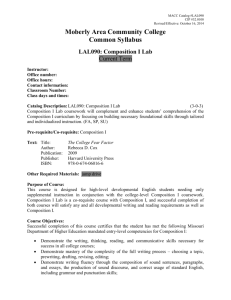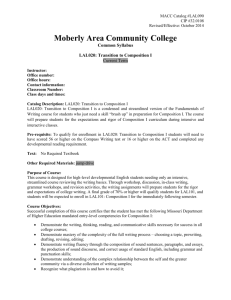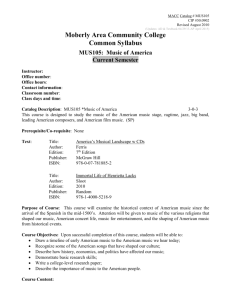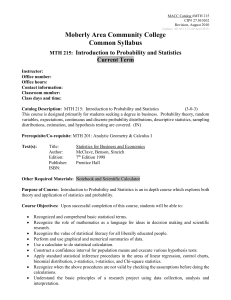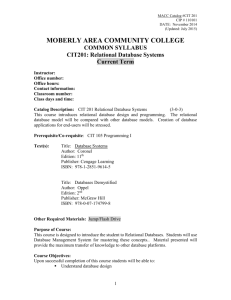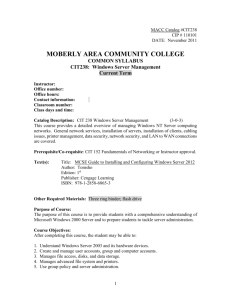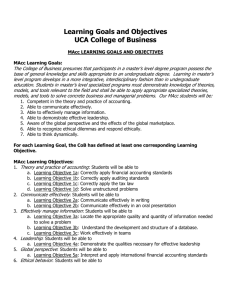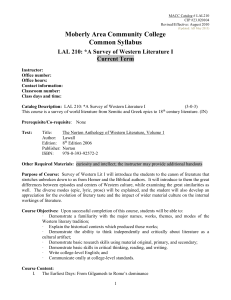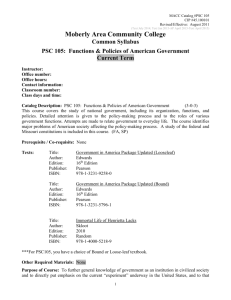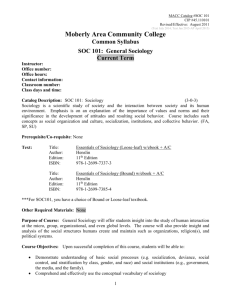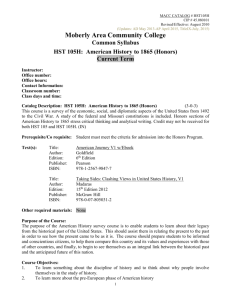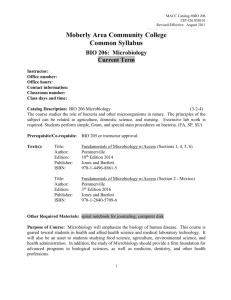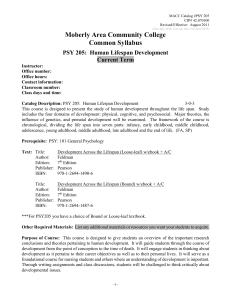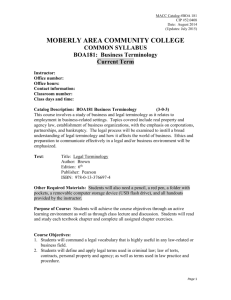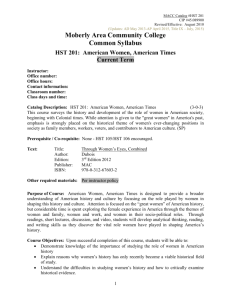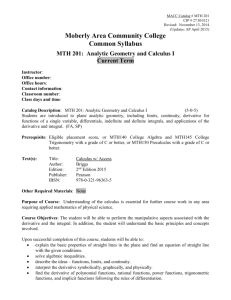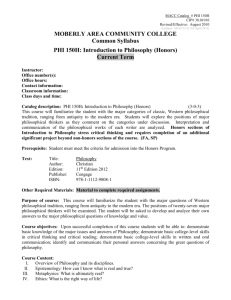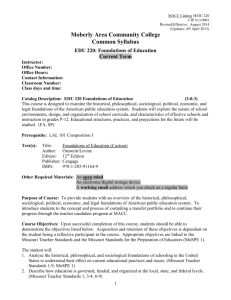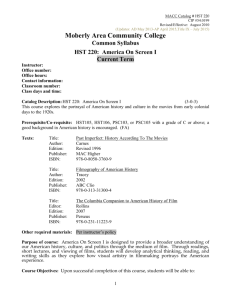LAL 120 American Literature Survey to 1870
advertisement
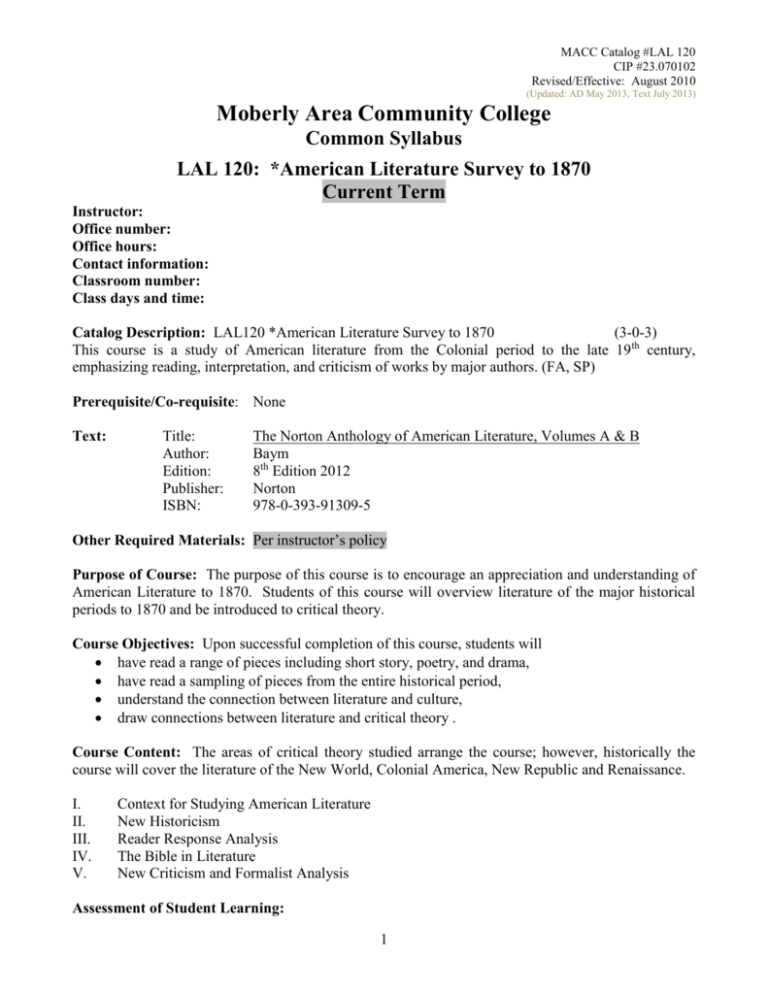
MACC Catalog #LAL 120 CIP #23.070102 Revised/Effective: August 2010 (Updated: AD May 2013, Text July 2013) Moberly Area Community College Common Syllabus LAL 120: *American Literature Survey to 1870 Current Term Instructor: Office number: Office hours: Contact information: Classroom number: Class days and time: Catalog Description: LAL120 *American Literature Survey to 1870 (3-0-3) This course is a study of American literature from the Colonial period to the late 19th century, emphasizing reading, interpretation, and criticism of works by major authors. (FA, SP) Prerequisite/Co-requisite: None Text: Title: Author: Edition: Publisher: ISBN: The Norton Anthology of American Literature, Volumes A & B Baym 8th Edition 2012 Norton 978-0-393-91309-5 Other Required Materials: Per instructor’s policy Purpose of Course: The purpose of this course is to encourage an appreciation and understanding of American Literature to 1870. Students of this course will overview literature of the major historical periods to 1870 and be introduced to critical theory. Course Objectives: Upon successful completion of this course, students will have read a range of pieces including short story, poetry, and drama, have read a sampling of pieces from the entire historical period, understand the connection between literature and culture, draw connections between literature and critical theory . Course Content: The areas of critical theory studied arrange the course; however, historically the course will cover the literature of the New World, Colonial America, New Republic and Renaissance. I. II. III. IV. V. Context for Studying American Literature New Historicism Reader Response Analysis The Bible in Literature New Criticism and Formalist Analysis Assessment of Student Learning: 1 MACC Catalog #LAL 120 CIP #23.070102 Revised/Effective: August 2010 (Updated: AD May 2013, Text July 2013) Reading Responses 40% Papers 40% Final Project 20% (Note: the percentages listed are approximate.) Description of Major Assignment(s)/Project(s): Reading Responses (Threaded Discussions): Writing a collection of responses, thoughts and reactions is an excellent way to improve your reading and thinking skills. You will respond in writing to each assigned reading. All entries (even Threaded Discussions) must be 250 words and edited. Papers: For each area of critical theory, you will compose a paper responding to one of several prompts. The paper should be academic in tone and tightly constructed around the prompt. You will be given more detail when the papers are assigned. Final Project: You will construct an anthology of poetry based in your conception of canon. You will be given more details when the project is assigned. Grading Scale: 100%-90% = A 89%-80% = B 79%-70% = C 69%-60% = D 59% or below = F Statement to Connect Course with General Education Outcomes or Technical Program Outcome Statement: In compliance with MACC’s General Education outcomes, the student who successfully completes this course will be able to: The student will assess and appreciate artifacts in language, art, music, or philosophy and be able to evaluate those artifacts as representations of form, cultural context, and individual expression. o The student will recognize genres, periods, theories, and conventional and experimental forms. o The student will create cultural artifacts that exhibit craftsmanship, innovation, and ingenuity. o The student will demonstrate critical thought in the evaluation of artifacts of diverse culture. Students of American Literature will learn an appreciation of artifacts in literature by reading and connecting them to genres, periods, and cultural context. Instructor Policies: Academic Dishonesty: MACC board policy is as follows: “Academic dishonesty by students damages institutional credibility and unfairly jeopardizes honest students; therefore, it will not be tolerated in any form.” Forms of academic dishonesty include but are not limited to the following: violations of copyright law, plagiarism, fabrication, cheating, collusion, and other academic misconduct. Incidents of dishonesty regarding assignments, examinations, classroom/laboratory activities, and/or the submission of misleading or false information to the College will be treated seriously. The procedure for handling academic dishonesty is outlined in the Student Handbook 2 MACC Catalog #LAL 120 CIP #23.070102 Revised/Effective: August 2010 (Updated: AD May 2013, Text July 2013) (Policy Handbook M.010). In cases of alleged academic dishonesty, the burden of proof is on the student, not on the instructor. Attendance Policy: Any student who misses two consecutive weeks of class during a regular sixteenweek semester or the equivalent proportion of class time during a shorter session will be dropped from the class by the instructor unless acceptable justification is supplied. Additionally, any student who misses more than one-fourth of the entire number of in-seat class meetings in a regular 16-week semester or the equivalent proportion of class time during a shorter session, may be dropped from that class by the instructor if, in the opinion of the instructor, the student does not have reasonable opportunity to succeed in the class. A student’s attendance rate will be calculated based upon the first day of the semester (not the student’s date of enrollment in the course). Student attendance must be defined in a different manner for online, hybrid, and virtual courses. Student attendance in these courses is defined as active participation in the course. Online, hybrid, and virtual courses will, at a minimum, have weekly mechanisms for student participation, such as any or all of the following methods: a. Completion of quizzes or exams b. Submission of assignments c. Participation in threaded discussions d. Communication with the instructor A student who does not participate in an online, hybrid, or virtual course for two consecutive weeks will be dropped by the instructor unless acceptable justification is supplied. As with ground courses, a student’s attendance rate in online courses will also be calculated based upon the first day of the semester. If a student does not demonstrate active participation in the online course within the first two weeks (or the equivalent proportion of class time during a short session), the student will be dropped as “never attended.” Simply logging into an online class does not constitute active participation. Students should be aware that their dropping a course and their last date of attendance in the course may impact their financial aid. (Policy Handbook I.090 and M.095) We will think, act, and react as a community of learners and writers. In order to do this, everyone must attend on a regular basis. In connection with attending, listening and participating in class are essential ingredients of active learning. In my view, the 25% of the class periods that can be missed represent a fair number of absences, so I do not consider excuses. In other words, there is no such thing as an unexcused or an excused absence. If you do find it necessary to miss a class period, it will be your sole responsibility to find out what you will miss or missed. I will not track you down and tell you, nor will your lack of knowledge constitute a good reason to turn in late work. Tardiness: If you plan to come to class, plan to come on time. I will take roll once at the beginning of class. In the event that you are unable to arrive on time, please quietly take your seat. You will be counted absent for that class period unless you see me after class and ask me to adjust the attendance record. Make-up and late work: Class work cannot be made up and will not be accepted late regardless of the reason for the tardiness or absence. 3 MACC Catalog #LAL 120 CIP #23.070102 Revised/Effective: August 2010 (Updated: AD May 2013, Text July 2013) Extra-credit work: None Schedule of Student Assignments/Activities: Week 1: Context for Studying American Literature Week 2-5: New Historicism Week 6-8: Reader Response Analysis Week 9-11: The Bible in Literature Week 12-14: New Criticism and Formalist Analysis Week 15 & 16: Final Project ADA Statement Students who have disabilities that qualify under the Americans with Disabilities Act may register for assistance through the Office of Access and ADA Services. Students are invited to contact the Access Office to confidentially discuss disability information, academic accommodations, appropriate documentation and procedures. For more information, please call either the Moberly office at (660) 263-4100 x 11240 or the Columbia office at (573) 234-1067 x 12120, or visit our web page at http://www.macc.edu/index.php/services/access-office. Title IX Statement MACC maintains a strict policy prohibiting sexual misconduct in any form, including sexual harassment, sexual discrimination, and sexual violence. All MACC employees, including faculty members, are considered mandated reporters of sexual misconduct and as such are expected to contact the Title IX Coordinator when they become aware, in conversation or in writing, of an incident of sexual misconduct. For more information on this policy or to learn about support resources, please see http://www.macc.edu/sexual-misconduct-policy or contact Dr. Jackie Fischer, MACC’s Title IX Coordinator, at 660-263-4110, ext. 11236 or jackief@macc.edu. 4



